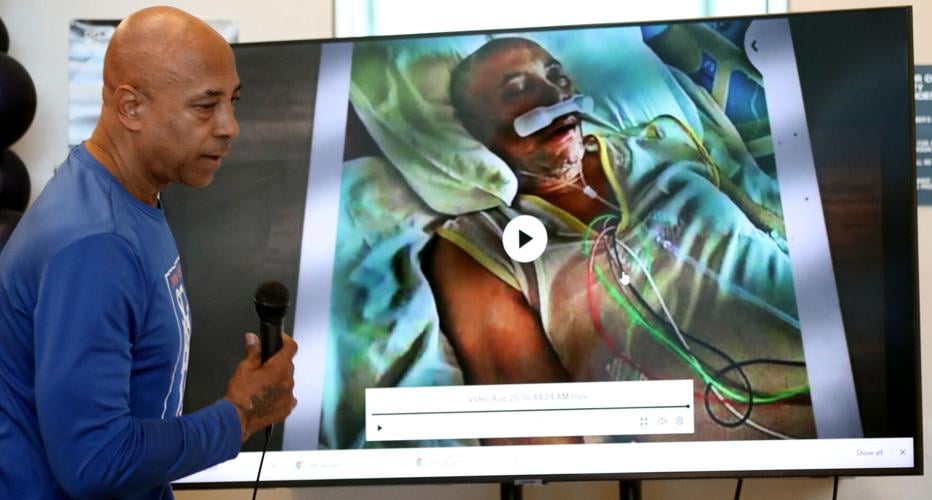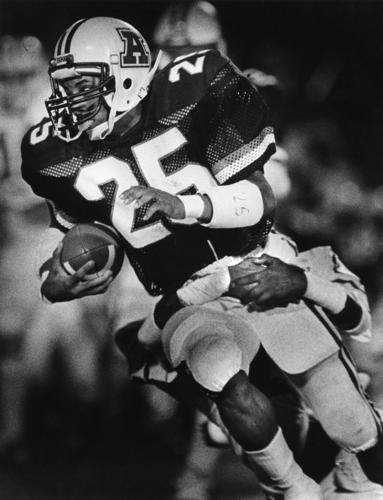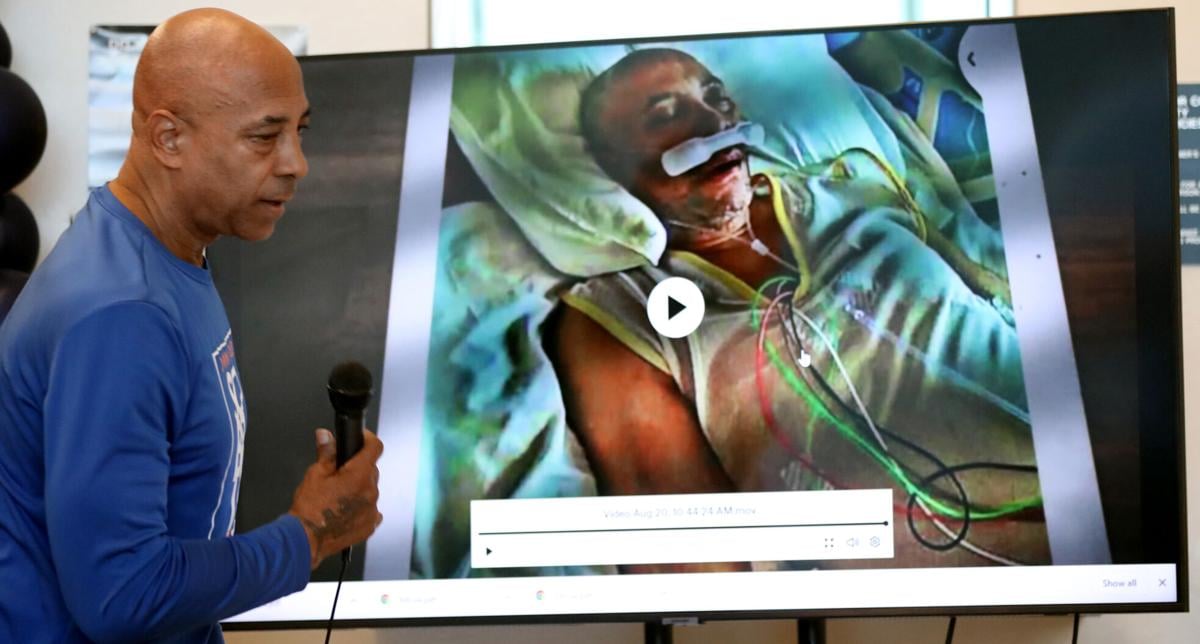For the first time in nearly 30 years, former Arizona Wildcat and NFL player Vance Johnson is back in Tucson, and he's not planning to leave anytime soon.
Johnson, who played for the Denver Broncos after leaving the UA and has been in recovery from alcohol and drug addiction for the past nine years, is working as ambassador for America's Rehab Campuses. The company's primary treatment and detox facility opened in Tucson five years ago.
Johnson shared his story of addiction and recovery to a small group during a recent celebration at Pima County Adult Probation Services, talking about his tough childhood. He and his sister witnessed his father abuse his mother almost daily, which Johnson said had a severe and lasting effect.
"I didn't know how I was going to cope with life," Johnson said. "I got to the point where I started thinking inside my head that I was going to go up Mount Lemmon and commit suicide by jumping off of one of those rocks up there."
While trying to figure out how he was going to make it, Johnson began watching sports on television and decided he wanted to become a professional football player. A standout track athlete and football player at Cholla High School, Johnson said that he was focused only on sports in high school and college.
His freshman year at the UA, he attended the 1982 NCAA Championship and competed against Carl Lewis, besting the top-ranked long jumper in the country. He went on to win the gold medal at the Junior Pan American games. In 1984, he narrowly missed making the U.S. Olympic team, finishing fourth in the long jump at the U.S. Olympic Trials.
In football, Johnson started all four seasons with the Wildcats as a multipurpose running back, but at 5-foot-11, he had to switch to wide receiver to make it in the NFL. He said he started following Jerry Rice around and copying what he did, and ended up getting drafted by the Broncos with the second pick of the second round.
By that time, he'd already fathered two children, whom he says he abandoned. While admittedly he wasn't a good father, he told the group that he still wasn't following in his own father's footsteps by using drugs or drinking. But that quickly changed.
In the fourth and final preseason game with the Broncos as a rookie, Johnson dropped a punt and was reprimanded by coaches, who threatened to cut him.
"The very next morning on the way, I stopped by a liquor store for the first time in my life and had my first drink. And I didn't get cut," Johnson said. "I literally became an alcoholic right away. I ended up actually starting to smoke weed, too, and I was taking different types of drugs and pills because of the injuries I had to my body."
He began to abuse his current wife, saying the police let him off with a warning time after time. During one particularly brutal beating, his wife stopped breathing. He was able to revive her, but continued his downhill spiral.
"I ended up actually getting into car accidents and pulled over and jail time many times, but because I was famous, the media didn't put it on the news," he said. "But I really struggled back then because of my addictions and the childhood trauma I grew up in and around."

University of Arizona receiver Vance Johnson against Oregon in 1983.
While Johnson's personal life continued to suffer, including more than one suicide attempt, his career did not. Johnson spent his entire NFL career for the Broncos from 1985-95, appearing in three Super Bowls and catching 415 passes for 5,695 yards and 37 touchdowns.
By the time he left the NFL, Johnson had fathered another child, and had learned that all three of his children were being abused.
"After my career, the only way I could cope with life was to use even more," he said.
It all came crashing down more than a decade later in 2007, after he'd reconnected with one of his adult sons.
"One day he called me and he wanted a ride back home. I decided not to respond to him and he got killed that very night," he said. "I decided to use more alcohol and drugs to the point that I was struggling so bad. I called my mom one night and told her that I was going to die."
His mother rushed over, driving Johnson to the hospital, where he immediately overdosed and had to be transported to a second hospital for more acute care. He was put into a medically induced coma and doctors told his family he was going to die, but he woke up on the 28th day.
John said he continued to struggle with mental health issues related to concussions, but eventually found his way to treatment, with help from his seventh ex-wife who he hadn't seen in almost a year.
"She reached out to the NFL because I was $1 million in debt, and they paid for me to go to treatment," he said. "I talked about all the things I had to deal with. The things you have to cope with and deal with in life can actually be used to offer hope to others. Everything we have to endure in life has a purpose."
Johnson has been in recovery since 2013, sharing his story around the country and in a 2019 book, “Uncovered: Why Becoming Less Became Everything." He opened the Vance Johnson Recovery Center in Las Vegas and has begun working as a counselor with the popular A&E reality show "Intervention."
He said after living all over the country, his recovery made his return home possible.
"I started to get really close to different people that were working at America's Rehab Centers, which to me is one of the top centers in the country," he said. "Making friends with them and sharing my testimony with the people in treatment, I got to the point where I felt like, God, I would really just love to stay back home in Tucson and even work with them."
Shortly after, he was invited to become the ambassador, saying that he's excited to continue helping others through his work.
"When I left treatment ... I just (wanted) to go back to this very place so I can be transparent in Tucson, Arizona, because Tucson is home for me," he told the group.
It took nearly a decade, but he finally made it.
Photos: Arizona upsets #1 USC football in 1981
Arizona vs. USC football
Updated
UA head coach Larry Smith is carried off the field at Arizona Wildcats at USC Trojans on Oct. 10, 2981 in Los Angeles. Arizona won, 13-10
Arizona vs. USC football
Updated
UA fullback Rory Barnett carries during Arizona Wildcats at USC Trojans on Oct. 10, 2981 in Los Angeles. Arizona won, 13-10
Arizona vs. USC football
Updated
A UA ball carrier during Arizona Wildcats at USC Trojans on Oct. 10, 2981 in Los Angeles. Arizona won, 13-10
Arizona vs. USC football
Updated
USC ball carrier (33) runs into a scrum of UA and USC linemen during Arizona Wildcats at USC Trojans on Oct. 10, 2981 in Los Angeles. Arizona won, 13-10
Arizona vs. USC football
Updated
USC running back Marcus Allen is brought down during Arizona Wildcats at USC Trojans on Oct. 10, 2981 in Los Angeles. Arizona won, 13-10
Arizona vs. USC football
Updated
UA receiver Vance Johnson (83) leaps out of the camera frame for a completed pass during Arizona Wildcats at USC Trojans on Oct. 10, 2981 in Los Angeles. Arizona won, 13-10
Arizona vs. USC football
Updated
USC running back Marcus Allen is upended during Arizona Wildcats at USC Trojans on Oct. 10, 2981 in Los Angeles. Arizona won, 13-10
Arizona vs. USC football
Updated
Arizona players celebrate the upset victory over USC during Arizona Wildcats at USC Trojans on Oct. 10, 2981 in Los Angeles. Arizona won, 13-10






